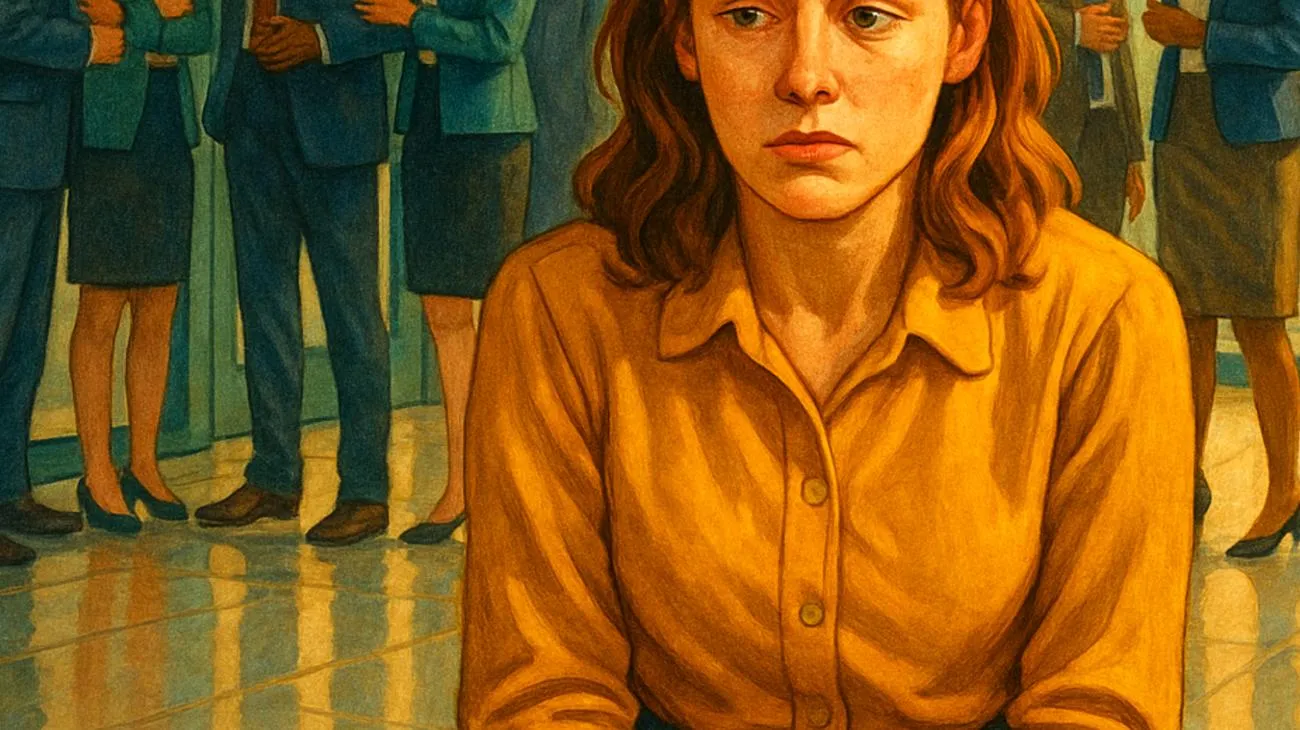This Is What It Means If You Suffer From Social Anxiety, According to Psychology
You know that feeling when your boss asks you to present in front of the entire team, and suddenly your heart decides to audition for a drum solo? Or when you’re at a networking event, and instead of mingling, you’re calculating the exact distance to the nearest exit? Well, buckle up because we’re about to dive deep into what psychology actually says about social anxiety – and spoiler alert, it’s way more fascinating and fixable than you think.
Social anxiety disorder affects approximately 7% of adults in the United States annually according to the National Institute of Mental Health, with similar prevalence rates worldwide. That’s millions of people who think they’re just terrible at human interaction when they’re actually dealing with a legitimate psychological condition. Let’s get real for a hot minute – this isn’t just being nervous about presentations or feeling awkward at parties.
Breaking News: Your Brain Has Trust Issues
Here’s where things get scientifically spicy. Social anxiety isn’t just occasional butterflies before big events. According to the Mayo Clinic, we’re talking about a persistent, excessive fear of social situations where you might be scrutinized, judged, or embarrassed. It’s like having a personal bodyguard in your brain, except this bodyguard thinks everyone at Starbucks is plotting against you.
The key difference between regular social jitters and full-blown social anxiety disorder lies in something psychologists love to geek out about: functional impairment. While shy people might feel slightly uncomfortable at social gatherings, people with social anxiety disorder experience marked disturbance in their daily functioning. We’re talking about avoiding promotions, skipping social events entirely, or restructuring your entire life around dodging human interaction.
Living in multicultural environments adds its own unique plot twist to this story. Picture navigating a business meeting where you need to switch between different languages, respect various cultural norms, and somehow remember appropriate greetings depending on who you’re talking to. For someone with social anxiety, these social landscapes can feel like playing chess while riding a roller coaster blindfolded.
Your Body Becomes a One-Person Emergency Response Team
When social anxiety kicks in, your body essentially transforms into a walking, talking anxiety alert system that nobody asked for. The physical symptoms are absolutely no joke, and they’re backed by extensive research on stress responses. We’re talking about racing heart, sweating, trembling, nausea, dizziness, and shortness of breath – basically, your body’s way of preparing for a zombie apocalypse when all you’re doing is ordering coffee.
Here’s the science bit that’ll blow your mind: your amygdala – that almond-shaped drama queen in your brain – signals your hypothalamus to activate the sympathetic nervous system. This releases adrenaline and cortisol, causing your heart rate and blood pressure to spike faster than you’d expect. Your brain literally cannot tell the difference between a real threat and Sarah from HR asking about your weekend plans.
But wait, there’s more! The cognitive symptoms are where social anxiety really shows off its creativity. Research reveals that people with social anxiety experience heightened cognitive distortions – basically, your brain becomes an Olympic-level athlete in the sport of catastrophic thinking. You start imagining worst-case scenarios that would make Hollywood disaster movies look optimistic.
The Mental Gymnastics Olympics
People with social anxiety don’t just overthink – they overthink with the dedication of a PhD student researching their thesis. Before a social interaction, they’re running mental rehearsals of every possible conversation. During the interaction, they’re simultaneously participating AND providing live commentary on their own performance like they’re hosting their own personal sports broadcast. After it’s over, that’s when the real show begins: endless replay analysis of every word, gesture, and facial expression.
The National Institute of Mental Health documents that this isn’t just perfectionism having a bad day. It’s a specific pattern of cognitive distortions where your brain starts interpreting neutral social cues as threats. You begin assuming everyone notices that tiny coffee stain on your shirt, or that your laugh sounds weird, or that people are secretly group-texting about your choice of small talk topics.
When Avoidance Becomes Your Comfort Zone Prison
Here’s where social anxiety gets really sneaky and starts offering what seems like helpful life advice. It whispers sweet nothings like “Hey, why don’t we just work from home forever?” or “You know what, online grocery shopping is so much more convenient.” These little avoidance strategies feel like relief in the moment, but they’re actually feeding the anxiety monster like you’re running a five-star restaurant for psychological problems.
Psychologists have a fancy name for these behaviors: safety behaviors. The Mayo Clinic emphasizes that these avoidance patterns are like putting a designer band-aid on a broken bone – sure, you’re not dealing with the immediate scary social situation, but you’re also never learning that most people are way too busy worrying about their own stuff to judge you as harshly as you think they are.
These safety behaviors become the key feature that separates normal social nervousness from clinical social anxiety disorder. When you start planning your entire life around avoiding human interaction, that’s when mental health professionals start taking notes and nodding meaningfully.
Plot Twist: It’s Not Actually Your Fault
Before you start wondering what you did in a past life to deserve this particular brain quirk, let’s talk facts. Modern psychological research shows that social anxiety disorder has multifactorial origins, including genetic predisposition, neurotransmitter imbalances, and environmental factors. This has about as much to do with personal weakness as having brown eyes or being left-handed.
Family studies and twin studies reveal there’s definitely a hereditary component – some people are just born with a more sensitive social threat detection system. It’s like having a car alarm that goes off when a leaf falls on the windshield. Others might develop social anxiety from life experiences, family dynamics, or learning anxiety patterns during development. Sometimes, your brain just decides to be extra cautious about social situations, and there’s no dramatic backstory required.
In multicultural environments, where you might encounter dozens of different cultural backgrounds in a single day, some people’s social anxiety gets an extra challenge mode. Navigating different languages, customs, and social expectations can amplify fears of making cultural mistakes or appearing disrespectful. It’s like trying to master multiple video games simultaneously while everyone’s watching.
Detective Work: Recognizing the Signs
So how do you know if what you’re experiencing crosses the line from normal social butterflies into social anxiety disorder territory? Research institutions use specific diagnostic criteria, but here are the red flags that should make your mental health radar start beeping:
- Physical symptoms show up consistently in social situations – racing heart, sweating, shaking, or nausea that happens regularly, not just before major life events
- Persistent worry dominates your mental real estate before, during, and after social interactions, like having a very dramatic inner critic with no off switch
- Avoidance becomes your default setting – you’re making excuses, calling in sick, or completely restructuring your life to dodge social situations
- The fear feels completely out of proportion to the actual situation – your anxiety level for a casual lunch meeting matches what most people would feel about extreme sports
- It’s actively sabotaging your goals – you’re turning down promotions, avoiding making friends, or missing out on experiences because social fear is running the show
Research notes that these symptoms need to persist for six months or more and cause significant distress or impairment in daily functioning to meet diagnostic criteria. We’re not talking about occasional nervousness here – we’re talking about a consistent pattern that’s genuinely interfering with your ability to live your best life.
The Treatment Success Story Nobody Talks About
Here’s the plot twist that makes this entire anxiety adventure worth discussing: social anxiety disorder is incredibly treatable. Like, embarrassingly treatable considering how much chaos it can create in someone’s life. Cognitive-behavioral therapy has success rates that would make other medical treatments jealous, and there are evidence-based strategies that can help people completely reclaim their social lives.
Meta-analyses and randomized controlled trials consistently show that CBT, often combined with exposure therapy and social skills training, produces significant and lasting improvement for most patients. In some cases, medications like selective serotonin reuptake inhibitors can also be helpful. The key is early recognition and professional intervention – basically, catching this thing before it completely takes over your social calendar.
The most liberating part? Understanding that social anxiety is a recognized psychological condition with specific mechanisms, not a character flaw or personal failing. It’s like finally getting the instruction manual for that complicated piece of furniture you’ve been trying to assemble with nothing but determination and increasingly creative curse words.
Research consistently shows that people who understand their social anxiety, recognize the patterns, and seek appropriate support can develop effective coping strategies and significantly improve their quality of life. You’re not doomed to a lifetime of hiding in bathroom stalls at networking events or creating elaborate excuses to avoid social gatherings. If any of this sounds familiar – if you’re recognizing your own experiences in these descriptions – consider it permission to stop labeling yourself as “just shy” and start acknowledging that you might be dealing with something more significant and, more importantly, something that’s completely manageable with the right support and evidence-based therapeutic approaches.
Table of Contents

